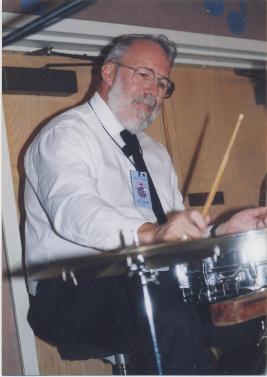by Bert Thompson
THE HAPPY PALS WITH BRIAN CARRICK—"KID BASTIEN FOREVER KICK-
ASS NEW ORLEANS JAZZ PARTY 2007" (New Orleans North CD-007). Playing
time: 69 mins. 0 secs.
My Blue Heaven*; When You and I Were Young, Maggie†; Love in Bloom††; Bugle
Boy March; Bright Star; Undecided**; Mobile Stompº; Over the Waves; How about
You?*º; High Society.
Recorded at Grossman’s Tavern, Toronto, Canada, Feb. 9-10, 2007.
Personnel: Patrick Tevlin, trumpet, slapstick, vocal*; Roberta Tevlin, trombone,
vocal**; Brian Carrick, clarinet, tenor sax, vocal†; Toby Hughes, alto sax; Roberta
Hunt, piano, vocal††; Rainer Hunck, banjo (except Alex Ralph, banjoº); Philip
Carney, string bass; Chuck Clarke, drums.
New Orleans—party town par excellence, as the Mardi Gras season each year or a
stroll down Bourbon Street any night can attest. Since about 1938 the motto “The
City That Care Forgot” (at least until Katrina) has applied to the Crescent City.
Long a devotee of the city and its music, Cliff “Kid” Bastien emigrated from the U.K
to Canada, where in Toronto he formed a couple of bands to play the New Orleans
style of jazz: the Camelia Jazz Band and the Happy Pals Jazz Band. Bastien loved a
good party, as the name “Happy Pals” might suggest, and during their years (which
began in 1968 and were on and off until Bastien’s demise) at their residency venue
Grossman’s Tavern, he and his cohorts headed up many a swinging party for the
fan base. After Bastien’s untimely death in February of 2003, Patrick Tevlin
assumed the leadership and trumpet chair. In the Bastien band, Tevlin had played
tenor sax, but after Bastien’s passing, he switched to trumpet—an instrument he had
been playing for quite a few years prior to meeting Bastien. Each year since Bastien’
s death, the band has held a “Kid Bastien Forever Kick-Ass New Orleans Jazz Party”
at Grossman’s. This CD, then, is a recording of the soirées held Feb. 9-10, 2007, to
celebrate both Mardi Gras (which is usually considered encompassing the entire six-
week Carnival season, Jan. 6-Feb. 20 in 2007, rather than just Fat Tuesday) and Kid
Bastien. And this past year they were also joined by Brian Carrick on reeds from
the U.K.
As becomes immediately apparent on listening to any recording by Bastien, he was
strongly influenced by the Kid Thomas band and trumpet style. As he said on
some LP notes written in 1971, “Upon hearing the Kid Thomas band on a trip to
Mendota, Minneapolis, [I] had a burning desire to form an authentic as possible
New Orleans band.” Tevlin also underwent an epiphany when first hearing Kid
Thomas in person during a visit to New Orleans in the 1970’s, and he has continued
in that style with both the present-day Happy Pals and his own trumpet playing.
And the rest of the group, including guest artist Carrick, readily participate.
Carrick, in fact, leads a couple of his own bands in the U.K: one called, like Thomas’
band, the Algiers Stompers; the other the Heritage Hall Stompers. In neither case
does he (or the band) become mere copyists, but rather try to capture the essence of
the Thomas bands. As Carrick himself puts it, “Claiming to replicate Kid Thomas’s
music would be an impertinence—as if anyone could. We celebrate it by adopting
its driving, melodic, stepping-out-for-pleasure style and its wide-ranging dancehall
repertoire, hoping to warm the hearts and feet of those who caught his band in the
old days, and those who wish they had.” And, of course, this same principle
inspired Bastien and the Happy Pals, as it continues to do today.
So what we have here is some first-rate uptown New Orleans jazz, rough at the
edges, but full of the passion the best of such jazz exhibits. This is no polished
studio band with memorized routines and solos and carefully orchestrated charts,
but one playing from the heart to the obvious joy and delight of the audience who,
through their encouragement and applause, participate significantly in the
proceedings. Just as Kid Thomas, Bunk, and all the other early New Orleans
jazzmen did, the band includes a broad variety of tunes in the repertoire here.
These should be familiar to almost everyone as they were to me, but when I first
glanced at the tune list, one in particular piqued my curiosity. I have never heard
any other jazz band tackle Love in Bloom, a tune I (and probably most of those, like
me, of a “certain age”) have always heretofore associated with Jack Benny’s off-key
manhandling of it on his violin. (Sung by Bing Crosby in the 1934 movie She Loves
Me Not, the song rose to #1 on the hit parade, where it stayed for six weeks.
According to Brian Rust’s Jazz Records 1897-1942, it was recorded by Claude
Hopkins and his orchestra in February of 1935. A bit later it became Benny’s theme
song.) And as the Happy Pals play it, it works.
Several of the others are jazz standards, but their treatment here is not stale. I
particularly enjoyed the laid back tempo of Mobile Stomp—it is so often taken at
racetrack speed. But here it gets the chance to swing, and it does, building to a
satisfying climax in the several out-choruses. A gospel tune not often heard, How
About You?, has Patrick Tevlin on vocal, and he is joined by the rest of the band
(Roberta Tevlin’s voice being perhaps most audible next to Patrick’s) and most of
the audience. The musical fare comes to an appropriate end with High Society, a
fine closer featuring the two reeds and reaching an exciting conclusion.
The band is obviously having a whale of a time, as is the audience. Other than
being there, this CD is probably the next best thing. The Happy Pals do, indeed,
make happy music. Listen for yourself.
For ordering information, contact Patrick Tevlin at <CDs@HappyPals.ca > and he
will supply the details.
|
|


